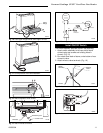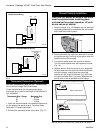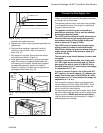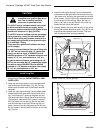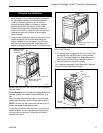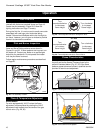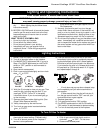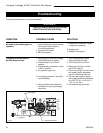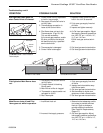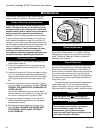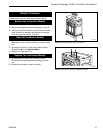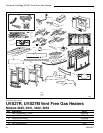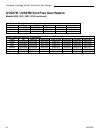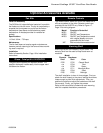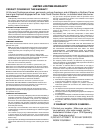
20
Vermont Castings UVS27 Vent-Free Gas Heater
20005004
The following procedures will help ensure that your
heater continues to perform safely and efficiently.
Firebox Cleaning and Inspection
Cleanliness is critical to correct operation of the
heater. The log set, burner, valve controls and air
circulation areas must all be kept free of dust and
unobstructed by debris. Inspect these areas before
each use and clean whenever accumulation is
evident. Follow the simple procedure outlined below.
Frequent cleaning may be necessary in living environ-
ments subject to excessive carpet lint or pet hair. For
example, if you live with a dog that sheds continuously,
you will need to inspect the burner area frequently and
clean it as often as the accumulation requires. In
extreme conditions, it may be necessary to clean
the burner and log set monthly or bi-weekly.
This appliance should be inspected and thoroughly
cleaned annually by a qualified gas technician.
Cleaning Procedure
1. Turn the burner OFF and let the heater cool com-
pletely before cleaning.
2. Lift the Front plate up and then swing the bottom
out to disengage it from the heater shell. (Fig. 25,
Page 15)
3. Remove the screen by lifting up and away from the
unit. Or, if so equipped, remove the glass panel by
rotating the two cams toward the front of the firebox.
Lift the panel up and off of the firebox frame. (Fig.
34)
4. Carefully inspect the log set for damage. Contact
your local dealer if any damage is evident. DO NOT
OPERATE THE HEATER WITH A DAMAGED OR
LOOSE LOG SET.
Use a soft-bristled brush vacuum cleaner attach-
ment to remove dust or debris from the log set, pilot
and burner. Use care as the log set is fragile.
5. Inspect the catalytic combustor at the top of the
firebox. Replace the combustor if any damage or
deterioration is evident.
6. Replace the screen or glass panel and the front
plate. DO NOT OPERATE THE HEATER WITH
THE SCREEN / GLASS PANEL OR FRONT
PLATE REMOVED.
Maintenance
WARNING
Turn the burner Pilot OFF before applying
paint. NEVER paint pilot or around pilot area.
Dust and debris accumulation can result in
poor performance. Inspect the Valve
compartment, burner parts and log set
frequently and Clean these parts monthly or as
often as accumulation warrants.
WARNING
Glass Replacement
If so equipped, do not operate this appliance with the
glass panel cracked, broken, or removed. Replace
damaged glass only with an approved ceramic glass
panel. Follow the Cleaning Procedure instructions
regarding parts removal.
Care of Cast Iron
An occasional dusting with a dry rag will help keep the
painted surfaces
looking new. Use high-temperature
stove paints, available through your local dealer, to
touch-up areas as needed. Clean areas to be painted
with a wire brush and be sure to cover the log set,
burner and valve assembly. Apply the paint sparingly;
two light coats of paint will give better results than a
single heavy coat.
Porcelain enamel surfaces
should be cleaned with
a soft, damp cloth. Do not use abrasive cleaning
agents. If necessary, use only a cleaning agent formu-
lated specifically for use on porcelain enamel surfaces.
Fig. 34 Remove the screen or glass panel.
Screen Hooks
Glass Latch
ST712



